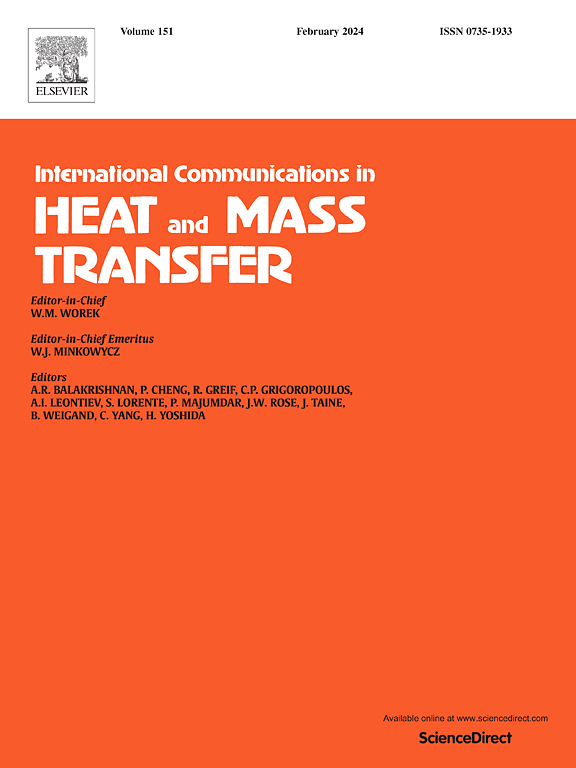Bubble-driven heater dynamics in saturated pool boiling
IF 6.4
2区 工程技术
Q1 MECHANICS
International Communications in Heat and Mass Transfer
Pub Date : 2024-11-26
DOI:10.1016/j.icheatmasstransfer.2024.108390
引用次数: 0
Abstract
Exploring energy within boiling system is becoming an effective way to enhance heat transfer nowadays. Novel bubble-driven heater has great potential to achieve it. However, heater dynamics in this technique are crucial but unclear in previous studies. Here, boiling on a movable suspended heater with the same density of liquid was simulated to investigate heater dynamics and corresponding mechanisms in detail. Smaller departure diameter and higher frequency were found on movable heater. Periodical up-down motion was observed and the upward movement only occurred at high heat fluxes. Up-down motion contributed to small dry spot diameter and rapid cold liquid supply. The mechanism of different motion over entire bubble cycle was investigated for the first time. Heater moved downwards due to evaporation momentum force () and add mass force () during the initial bubble growth stage with expanding triple line, moved upwards due to surface tension force () during bubble growth period with nearly constant triple line, and it moved downwards again due to when bubble departed. and which impeded bubble departure before were found benefit departure by induced movable heater. Heater manipulation mechanism was found and our study would benefit the design of smart and automatic heater.
饱和池沸腾中的气泡驱动加热器动力学
如今,在沸腾系统中探索能量已成为加强热传递的有效方法。新型气泡驱动加热器具有实现这一目标的巨大潜力。然而,该技术中的加热器动力学至关重要,但以往的研究并不清楚。在此,我们模拟了液体密度相同的可移动悬浮加热器上的沸腾,以详细研究加热器的动力学和相应机制。结果发现,活动加热器上的偏离直径较小,频率较高。观察到周期性的上下运动,只有在高热流量时才会出现向上运动。自上而下的运动导致干斑直径较小,冷液供应较快。首次研究了整个气泡周期内不同运动的机理。在三重线不断扩大的气泡生长初期,加热器受蒸发动量力(Fe)和质量增加力(Fa)的作用而向下运动;在三重线几乎不变的气泡生长期,加热器受表面张力(Fs)的作用而向上运动;当气泡离开时,加热器又受 Fa 的作用而向下运动。发现之前阻碍气泡离开的 Fa 和 Fe 有利于诱导活动加热器的离开。我们发现了加热器的操纵机制,我们的研究将有助于智能和自动加热器的设计。
本文章由计算机程序翻译,如有差异,请以英文原文为准。
求助全文
约1分钟内获得全文
求助全文
来源期刊
CiteScore
11.00
自引率
10.00%
发文量
648
审稿时长
32 days
期刊介绍:
International Communications in Heat and Mass Transfer serves as a world forum for the rapid dissemination of new ideas, new measurement techniques, preliminary findings of ongoing investigations, discussions, and criticisms in the field of heat and mass transfer. Two types of manuscript will be considered for publication: communications (short reports of new work or discussions of work which has already been published) and summaries (abstracts of reports, theses or manuscripts which are too long for publication in full). Together with its companion publication, International Journal of Heat and Mass Transfer, with which it shares the same Board of Editors, this journal is read by research workers and engineers throughout the world.

 求助内容:
求助内容: 应助结果提醒方式:
应助结果提醒方式:


